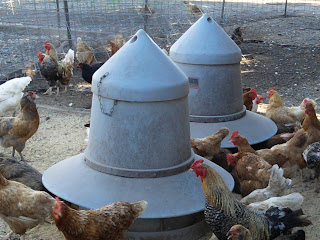We often get comments about how our eggs are far better than eggs from other small farmers. I think this probably has to do with the amount of time our girls spend on pasture. Many small producers deal with predator problems by limiting the time their birds have access to pasture. If your birds are confined to a lot with high fences and netting on the top or not allowed out until you can be around to watch them, they will be pretty safe, but their eggs won't be as good.
We deal with that problem by keeping some big dogs. It costs quite a bit to feed these small horses, but they chase off most of the coyotes, raccoons, fox and other critters who crave chicken dinners. This picture is from when we first got them. They were rescued Great Pyrenees that had been neglected. They aren't anywhere near as skinny now.
Our chickens are able to get out on pasture from dawn to dusk, maximizing the amount of fresh food they are able to consume. Our birds even forage during the winter. As long as the snow isn't to deep, they are out pecking at brown grasses and weeds. If the snow is deep, we provide them with hay and mix alfalfa into their feed.
Of course, we do provide a layer feed that is based on brewers mash (what is left over after ethanol production). This is a fairly high protein feed that our chickens thrive on. Don't ever let anyone tell you that ethanol production takes food away from the livestock industry! The byproduct is a better feed than straight corn. OK, Rant over.
The only time we confine them is for a couple of weeks when they are first starting to lay. If we don't do that, they lay their eggs wherever. If we confine them, they get into a habit of laying them in the hen house so the eggs aren't so difficult to find.
Of course, some of them will still insists on laying their eggs in odd places, but most will go "home" to lay.
God Bless You All!
~Grama Sue











